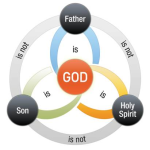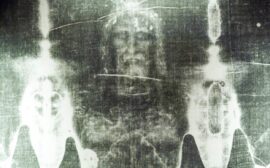 One of the important, yet misunderstood, doctrines in the Bible is that of the Trinity. In this article, the doctrine of the Trinity will be explained, then, it will be shown why a person should believe in the doctrine, and finally, why it matters. The Trinity is one of the major dividing lines between orthodox Christianity and heretical versions of Christianity.
One of the important, yet misunderstood, doctrines in the Bible is that of the Trinity. In this article, the doctrine of the Trinity will be explained, then, it will be shown why a person should believe in the doctrine, and finally, why it matters. The Trinity is one of the major dividing lines between orthodox Christianity and heretical versions of Christianity.
What is the doctrine?
The doctrine of the Trinity suggests that God is one, yet exists in three different persons: the Father, the Son, and the Holy Spirit. Some have criticized this doctrine as being a form of polytheism and leaving the roots of Judaist monotheism. However, this is not the case. The Christian understands that God is one God. Yet, this one God is manifested in three persons. Various methods have been used to describe this. One of my favorite illustrations is that of water. Water is found in three forms: solid, liquid, and gas. Despite being found in these three (four if you include plasma) forms, the substance is the same…water. So, now that the doctrine has been explained, the article will now examine why the doctrine should be accepted.
Why should one believe in the doctrine?
The doctrine of the Trinity is one of the more bizarre concepts in Christianity. However, it is founded upon strong evidence. There are certain things in life that may seem difficult to understand. However, those difficult things should not be cast aside as false if there is good evidence to suggest that they are realities.
The Deity of the Father
There is really no need to expound on the deity of the Heavenly Father as it is presented throughout the entire Bible. God the Father is revealed through the personal names given to Him throughout the Hebrew Bible. The classic personal name given to the Father is “YHWH.” Some translate the personal name of God as “Jehovah.” However, it seems that the name “Yahweh” is far more accurate. As found in Exodus 3:14, “And God said to Moses, “I AM WHO I AM.” And He said, “Thus you shall say to the children of Israel, ‘I AM has sent me to you’” (Exodus 3:14, NKJV). Another title given to the Father is “Elohim.” Elohim is an interesting title. It is a plural name given to a singular entity. Some have seen a reference to the Father’s plurality of persons. While this is debated, Erickson writes that “Grammarians have termed this phenomenon the quantitative plural. Water may be thought of in terms of individual raindrops or of a mass of water such as is found in the ocean. Knight asserted that this quantitative diversity is unity is a way fitting way of understanding the plural ‘elohim.’ He also believed that this explains why the singular noun (adonai) is written as a plural (GAF Knight 1953, 20)” (Erickson 1998, 354). There is no dispute that the Father was seen as divine by the Old and New Testament writers.
The Deity of Jesus
As mentioned in previous articles (“Essential Doctines: The Incarnation”), Jesus of Nazareth, as opposed to movements like the Jehovah Witnesses and the Mormon Church, is understood to be divine. Anything less is untrue to the context of the New Testament. Since this attribute has already been discussed in previous articles, it is not necessary to undertake the issue again. However, it would behoove us to mention one of the earliest mentions to Jesus’ divinity found in an early Christian hymn in Philippians 2:5-11.
In your relationships with one another, have the same mindset as Christ Jesus: Who, being in very nature God, did not consider equality with God something to be used to his own advantage; rather, he made himself nothing by taking the very nature of a servant, being made in human likeness. And being found in appearance as a man, he humbled himself by becoming obedient to death—even death on a cross! Therefore God exalted him to the highest place and gave him the name that is above every name, that at the name of Jesus every knee should bow, in heaven and on earth and under the earth, and every tongue acknowledge that Jesus Christ is Lord, to the glory of God the Father” (Philippians 2:5-11, NIV).
Verse 6 uses the “word ‘morphe’ contrasts with the word ‘schema’, which is also generally translated ‘form,’ but in the sense of shape or superficial appearance rather than substance. For Paul, an orthodox Jew trained in the rabbinic teaching of strict Judaism, verse 6 is indeed and astonishing statement. Reflecting the faith of the early church, it suggests a deep commitment to the full deity of Christ” (Erickson 1998, 350). Therefore it is undeniable that the earliest church understood Jesus of Nazareth to be the divine Son of God.
The Deity of the Holy Spirit
The Holy Spirit is the third person of the Holy Trinity. Dunn describes that the “word “spirit” (Hebrew ruah, Greek pneuma) is the word used from ancient times to describe and explain the experience of divine power working in, upon, and around men, and understood by them as the power of God” (Dunn 1988, 986). In Old Testament times, the Holy Spirit was seen as the “wind of God” (Genesis 8:1, Exodus 10:13, Exodus 14:21); the “breath of life” (Genesis 2:7, Job 33:4, Psalm 104:29); David coined the term “Holy Spirit” (ruach qodesh) to separate the Spirit of God from other spirits (Psalm 51:11); the Spirit of prophecy (Haggai 2:5, et al); the Spirit in direction of the end times, or the Spirit who would be poured out upon men and women (Ezekiel 39:29, Joel 2:28, etc.). In the New Testament, the Holy Spirit was seen as “wind” (John 3:8); “breath” (2 Thessalonians 2:8), “breath of life” (Revelation 11:1); the provider of salvation (Acts 2:38, 29); the teacher of truth (John 14:17); the advocate (John 14:26); the giver of spiritual gifts (Romans 12:6-8, 1 Cor. 12:8-10, 1 Cor. 112:29-30, Ephesians 4:11, and 1 Peter 4:11); and the giver of the fruits of the spirit (Galatians 5:22, 23). But do these Scriptures necessarily point to the divinity of the Holy Spirit? One could argue that they do, but there are more specific links which attribute the Holy Spirit as a person in the Godhead.
The baptismal formula definitively suggests that the Holy Spirit is as much God as the Father and the Son. Jesus said, “All authority has been given to Me in heaven and on earth. 19 Go therefore and make disciples of all the nations, baptizing them in the name of the Father and of the Son and of the Holy Spirit, 20 teaching them to observe all things that I have commanded you; and lo, I am with you always, even to the end of the age” (Matthew 28:18-20, NKJV). The three are linked together in Paul’s benediction (2 Corinthians 13:14). The Holy Spirit is linked to critical times of Jesus life: Jesus’ birth (Luke 1:35), His baptism (Matthew 3:16-17), and at His resurrection (Romans 8:11).
The early church recognized the Trinity. In the Didache, an early book that nearly made it to the New Testament, it is said, “And concerning baptism, baptize this way: Having first said all these things, baptize into the name of the Father, and of the Son, and of the Holy Spirit, in living water. But if you have no living water, baptize into other water; and if you cannot do so in cold water, do so in warm. But if you have neither, pour out water three times upon the head into the name of Father and Son and Holy Spirit. But before the baptism let the baptizer fast, and the baptized, and whoever else can; but you shall order the baptized to fast one or two days before” (Didache 7:1-4).
Justin Martyr, writing in the early 2nd century, also wrote concerning the Trinity, “ For, in the name of God, the Father and Lord of the universe, and of our Saviour Jesus Christ, and of the Holy Spirit, they then receive the washing with water… And in the name of Jesus Christ, who was crucified under Pontius Pilate, and in the name of the Holy Ghost, who through the prophets foretold all things about Jesus, he who is illuminated is washed” (Justin Martry, Apologies I.61). Ignatius of Antioch writes in the late 1st century, “For our God, Jesus Christ, was, according to the appointment of God, conceived in the womb by Mary, of the seed of David, but by the Holy Ghost. He was born and baptized, that by His passion He might purify the water” (Ignatius of Antioch, Epistle to the Ephesians, XVIII). Although the word trinity is never used in the Bible, the concepts of a Triune Godhead are clearly taught and understood by the earliest of Christians.
Why is the doctrine essential?
If one is to understand God as God is presented in the Bible, then it is essential to the Christian faith. Anything less is untrue to the nature of God, Jesus, and the Holy Spirit. To strip any one of the three from their divine nature is to have a false view of the person. Unfortunately, there have been many heresies that have developed over the millennia that have sought to undermine this doctrine.
Arianism
Jehovah Witnesses fit within this category. JH’s view Jesus as the incarnation of the archangel Michael. But the JH movement established by Charles Taze Russell is nothing new. Their beliefs can actually be seen in an early cult known as Arianism. An early cult known as Arians popularized a belief that Jesus of Nazareth was not completely divine. Jesus was a created individual who was given the highest status among humans. In light of the teachings of John 1:1 and the self-identification of Jesus Himself as recorded in the Gospels, such a notion should be rejected.
Docetism
Docetists denied the actual humanity of Jesus. They believed, like the Gnostics, that Jesus only appeared to be human.
Apollinarianism
Apollinarius developed a Christology that Jesus had two natures: human and divine. But, he carried it too far. He denied that Jesus had a human will.
Nestorianism
Nestorius completely divided the person of Jesus of Nazareth. Unlike Arian, Nestorius viewed the Spirit of Christ as being eternal, but the humanity of Jesus being only finite. Therefore, Jesus did not become divine until the Spirit of God rested upon Jesus.
Eutychianism
Eutychicus took Nestorius’ teachings even further. He seemed to indicate that once Jesus became divine, Jesus lost his human will and only then had the divine will.
Modalism
Modalists believed the essentials of the Trinity, but denied that they existed at the same time. In other words, they believed that God was the Father, then God ceased being the Father to become the Son, and then ceased being the Son to become the Holy Spirit. They do not believe that the Father, Son, and Spirit co-exist. This causes complications when one tries to fit the belief in the context of Scripture. For instance, at the baptism of Christ, we are presented with Christ being baptized, the Father speaking, and the Spirit descending like a dove. Therefore, this view cannot be accepted.
Mormonism
Mormons claim that there exists a Heavenly Father and a Heavenly Mother. These entities are but offspring of another set of divine parents. There are tremendous difficulties merging such a doctrine with the teachings of the Bible. Therefore if Jesus is seen to be the Son of God and there is evidence for the Trinity, then such a view must be rejected.
There are many other discrepancies that can be evaluated. However, the trinity is an important doctrine to understand and to accept if one is going to understand the nature and work of God. What’s more, the teaching of the Bible indicates that we are joined in with this divine relationship through the abiding of the Holy Spirit, paid for by Jesus at the cross, and established in the mind of the Almighty Father.
Bibliography
All Scripture noted as (NIV) comes from The New International Version. Grand Rapids, MI: Zondervan, 2011.
All Scripture noted as (NKJV) comes from The New King James Version. Nashville: Thomas Nelson, 1982.
Didache 7:1-4. Translated by Donalds and Robertson. http://www.earlychristianwritings.com/didache.html. Accessed March 4, 2014.
Dunn, James D. G. “The Holy Spirit.” Baker Encyclopedia of the Bible. Edited by Walter A.
Elwell and Barry J. Beitzel. Grand Rapids, MI: Baker Book House, 1988.
Erickson, Millard J. Christian Theology, 2nd Edition. Grand Rapids: Baker, 1998.
Ignatius of Antioch, “The Epistle of Ignatius to the Ephesians,” in The Ante-Nicene Fathers: The Apostolic Fathers with Justin Martyr and Irenaeus, ed. Alexander Roberts, James Donaldson, and A. Cleveland Coxe, vol. 1. Buffalo, NY: Christian Literature Company, 1885. pg. 57.
Justin Martyr, “The First Apology of Justin,” in The Ante-Nicene Fathers: The Apostolic Fathers with Justin Martyr and Irenaeus, ed. Alexander Roberts, James Donaldson, and A. Cleveland Coxe, vol. 1. Buffalo, NY: Christian Literature Company, 1885., pg. 183.
Knight, G. A. F. A Biblical Approach to the Doctrine of the Trinity. Edinburgh: Oliver & Boyd, 1953. In Millard J. Erickson. Christian Theology, 2nd Edition. Grand Rapids: Baker, 1998.





